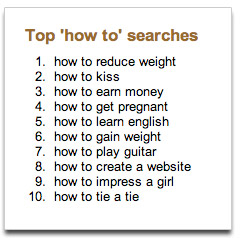Google recently announced their 2008 year-end Zeitgeist. "Zeitgeist" means "the spirit of the times", and the Google end of year Zeitgeist pages use aggregated search queries to present a snapshot in time of what people searched for in 2008 on Google all over the world.

Sarah Palin" was the fastest rising search query on Google in 2008
15 m loves to explore the aggregations of the billions of search queries that people type into the Google search box, as it gives us a glimpse of what millions of people have on their minds. Some of the popular queries lists are even quite narrative, telling wonderful little stories.

The Indian top ten "how to"- queries
While many of you probably are familiar with Google Zeitgeist, you might not have heard of Jonathan Harris. Jonathan Harris is an artist and computer scientist who makes online art that captures the world's expression - and gives us a glimpse of the soul of the Internet. His projects troll the Internet to find out what we're all feeling and looking for.
Wefeelfine.org is a project that aims to harvest human feelings from a large number of weblogs. Every few minutes, the system searches newly posted blog entries across the world for occurrences of the phrases "I feel" and "I am feeling". When it finds such a phrase, it records the full sentence, up to the period, and identifies the "feeling" expressed in that sentence together with the age, gender, geographical location and local weather conditions at the time the sentence was written.

The result is a database of several million human feelings. Through a series of interfaces, these feelings can be searched and sorted across a number of demographic slices. Do Europeans feel sad more often than Americans? Do women feel fat more often than men? Does rainy weather affect how we feel? Find out on wefeelfine.org!